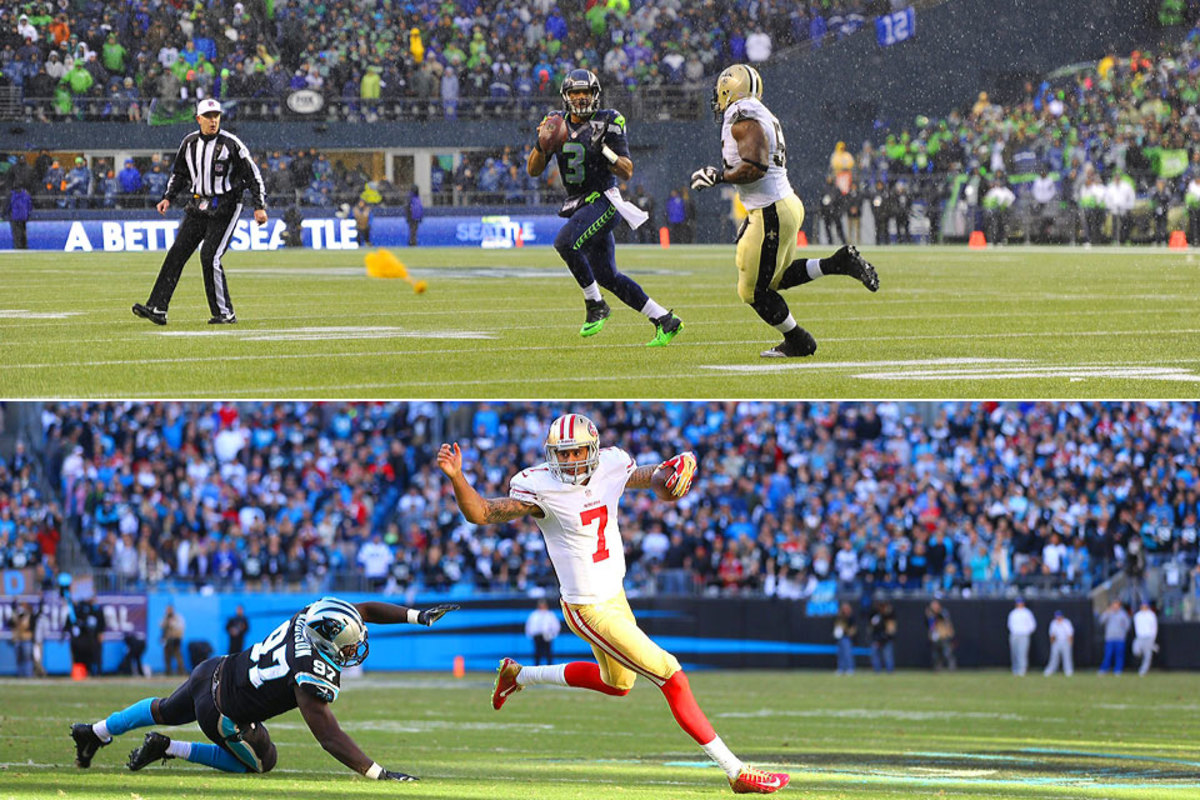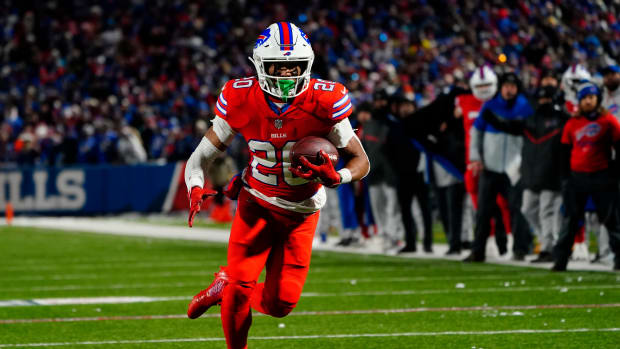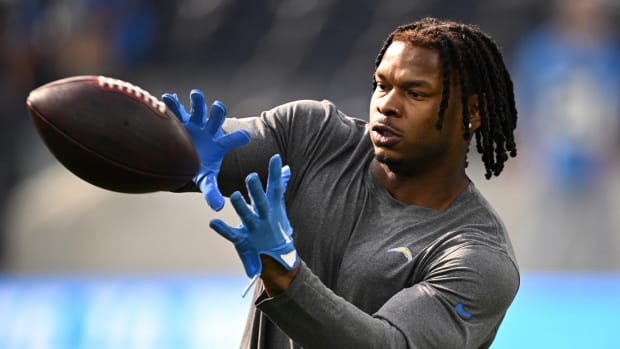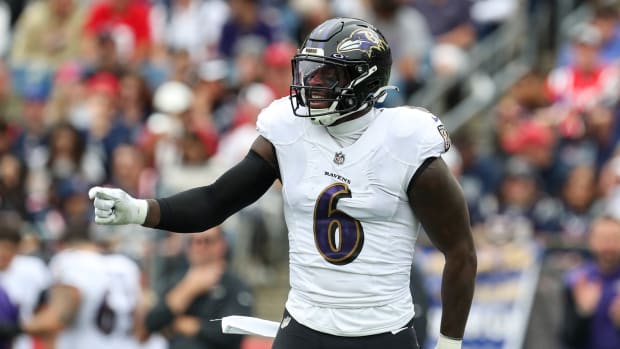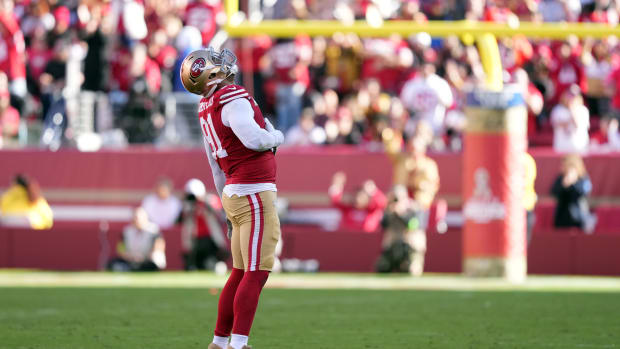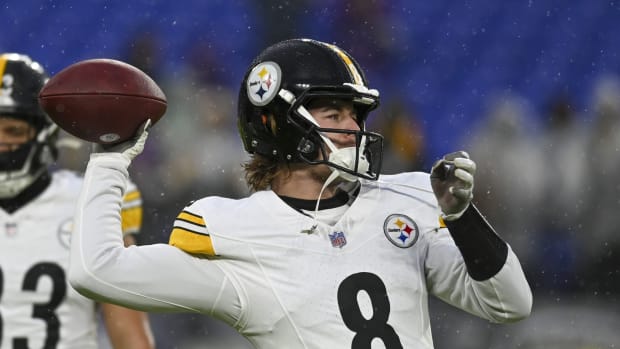The Next Wave of NFL QBs Is Here to Stay
CHARLOTTE, N.C. — Greg Roman’s favorite play-call from last Sunday, the one that led to Colin Kaepernick pilfering the opposing quarterback’s Superman shirt-rip celebration in the end zone, had been in the offensive coordinator’s back pocket since Nov. 10, when the 49ers fell to the Panthers, 10-9, at Candlestick Park.
“I was kicking myself for not running it then,” Roman told The MMQB. “I think we would have won the game if we ran it then, to be quite honest with you. So we came back and ran it this time. Hindsight is 20/20.”
Good thing he saved it for when it mattered most.
With nine minutes to go in the third quarter of last weekend’s divisional game at Carolina, Kaepernick stuck the ball in the belly of his tailback, Frank Gore, while receiver Quinton Patton sprinted across the formation from right to left, drawing cornerback Drayton Florence into man-to-man coverage. Kaepernick pulled the ball back from Gore and took off behind Patton, just four yards separating him from the end zone. Each of the three receivers on the field—Patton, Michael Crabtree and Anquan Boldin—locked onto a defender in front of Kaepernick. The only player in position to make a stop, Florence, overran the play and couldn’t adjust.
The touchdown gave the 49ers a 10-point lead and Kaepernick performed just as nimbly when the play was over: He mocked Panthers quarterback Cam Newton by pretending to bare an ‘S’ on his chest, then pantomimed buttoning up his shirt before turning to his own signature move: a biceps kiss.
The read-option was dialed back across the league in 2013, but San Francisco’s 23-10 victory was a potent reminder that it hasn’t died. It’s just another tool at the disposal of coordinators like Roman, who sprinkle it in like a pinch of salt for seasoning. It’s also a reminder that change is inevitable. This has been an important season for the NFL’s young quarterbacks, particularly since their surprising success last season raised a valid question: Do they have staying power? The answer: Four of the eight QBs in last weekend’s divisional round had no more than three seasons of experience (Kaepernick, Newton, the Seahawks’ Russell Wilson and the Colts’ Andrew Luck).
This year’s playoffs have an oddly scripted feeling. Tom Brady and Peyton Manning in the AFC Championship Game; Kaepernick and Wilson for the NFC title. It’s a perfect dichotomy, one conference championship game featuring the old guard and the other the new guard of NFL quarterbacks. Might we look back upon this postseason as the passing of the torch?
Two of a kind
Greg Roman reached into his bag of tricks to spring Kaepernick for a read-option TD last Sunday. Brady and Manning lack those youthful legs, but they have a few tricks of their own. FULL STORY
Manning is 37 and has had four neck operations; Brady is but a year younger. Kaepernick and Wilson are closer to the legal drinking age than they are to being over the hill, but they seem just as comfortable as their veteran counterparts on the big stage. Kaepernick played in Super Bowl XLVII last season, and either he or Wilson will play for the Lombardi Trophy in early February, showcasing the virtues of a hybrid skill-set and mobile quarterbacking. (To be fair, they also benefit from being paired with a top-five defense).
The NFL’s debate about mobile quarterbacks versus drop-back pocket passers is a bit like politics: neither party ever goes out of style, but power ebbs and flows depending on the leaders. The 49ers-Panthers tilt last Sunday at Bank of America Stadium was just the kind of new-guard showcase you’d expect to find: Newton warmed up in shiny “Supercam” custom cleats, and afterward, Kaepernick coolly described his celebratory taunt as “just a little shout out.” On the field, their play reflected the strides they’ve taken to keep their games effective and balanced.
Take Kaepernick, for example. Though he ran for 98 yards in the wild-card win over the Packers a week earlier, Roman thought the best place for him to operate against Carolina’s strong front seven was “in the pocket, trying to pick them apart.” The Panthers played the 49ers’ short routes aggressively, but Kaepernick made some big gains, like his 45-yard pass to Boldin on a slant-and-go that set up his touchdown scamper two plays later.
Defenses learned how to defend the read-option last offseason. You play with gap discipline, you don’t just turn your edge rushers loose upfield, and you try to avoid having your secondary players turn their backs to the line of scrimmage. Offensive coordinators also realized that you can’t expose quarterbacks to repeated hits. But facing 2nd-and-goal from the 4-yard line, with a chance to go up by 10 in the divisional round? “If you’re capable of utilizing it,” Roman says, “you’ll probably see it this time of year.”
To NFL historians, next weekend’s conference championships matter very little. No matter who wins, the narrative will be the same. The old guard and the new guard are on a collision course for Super Bowl XLVIII. And soon enough, the true Superman will be revealed.
































